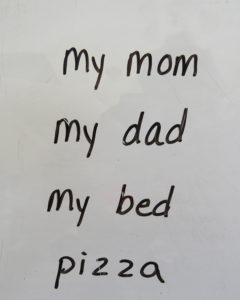This Thanksgiving poem was a lot of fun! I even had parents email me back commenting on how much they enjoyed reading their child’s poem.
It works best for students in Grades 2-5. I’ve included a version for K-1 or struggling writers below.
A Summer Version of this Poem

We had so much fun using this same format to write the poem “Packing” in our summer Poetry Around the World camp, that I decided to use it again at Thanksgiving time, but changed the title from “Packing” to “I’m Thankful For.”
Rhyme and Alliteration
For this prompt, students use rhyme and alliteration to write a long list of things that they’re thankful for.
Throughout this Thanksgiving poem they can add words that may be silly or odd, but that fit the pattern of rhyme or alliteration. This adds humor to their poem!
*This post contains affiliate links. For more information, see my disclosures here.*
Common Core State Standards
NOTE: This lesson can address the following Common Core State Standard: CCSS.ELA-LITERACY.RF.K.2.A. L.K.2.C and L.K.2.D.
HERE ARE THE STEPS!
Have your students:
Brainstorm
- Brainstorm a long list of things that they are actually thankful for.
Beginning Sounds
2. Group words that begin with the same sound.
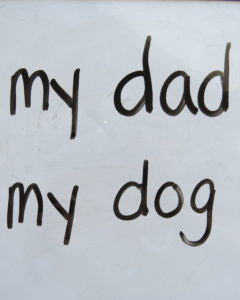
Rhyme
3. Group words that rhyme.
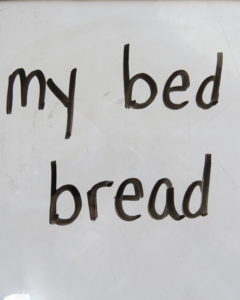
Add Words
4. Add words to each set of alliteration and rhyme so that there’s 2 or more words in each group. These added words can be ANYTHING! They don’t have to make sense and can be silly.
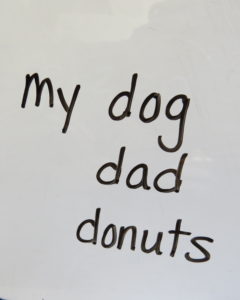
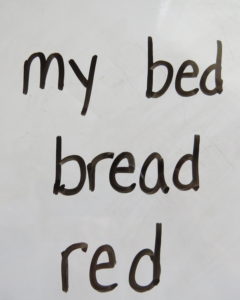
Alliteration–Squares
5. Draw a square around each group of words that begin with the same sound (alliteration).
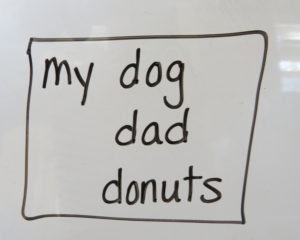
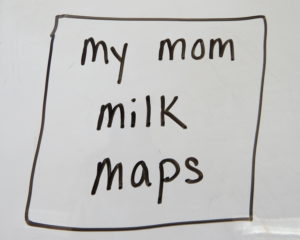
Rhyme–Circles
6. Draw a circle around each group of words that rhyme.
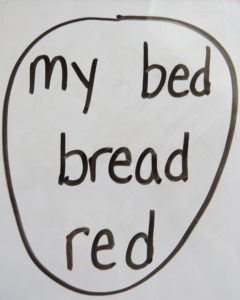
Young or Struggling Writers
This lesson may be too difficult for young or struggling writers. This lesson can actually be taught in 4 levels of difficulty.
Phonetic Spelling
For the 1st level, students can write a list of things that they are thankful for using phonetic spelling. That means that they write the letters that represent the sounds that they hear.
For example, they might write family using the letters, FAMLE. Writing FAMLE for the word FAMILY is age appropriate and to be praised and encouraged. The child is writing the sounds that he/she hears.
Alliteration
The next level of difficulty is writing groups of words that begin with the same sound (alliteration).
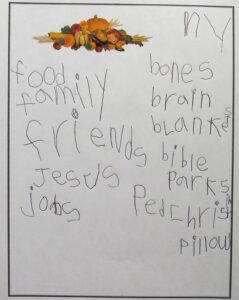
Rhyme
Level 3 consists of writing groups of words that rhyme.
Alternating Rhyme and Alliteration
The 4th and final level is the original idea for this lesson. Students write a long list of words. Their groups of words alternate between rhyme and alliteration.
NOW TO WRITE!
I have the students write on a piece of bordered paper so the final draft looks nice.
Title
7. First write the title “I’m Thankful For” at the top of the page.
Alternate Rhyme and Alliteration
8. Then, to write the list, alternate by writing:, a group of words that rhyme (circled group), a group of words that begin with the same sound (squared group), a group of words that rhyme (circled group), a group of words that begin with the same sound and so on until they’ve used up all of the words that had circles and squares around them.
Rhythm
Remind the students to consider rhythm so that the poem has a bit of a beat. To create this, they might need to add the word “and” here and there.
EASY ART ACCENTS
For this particular poem, I had cornucopia stickers similar to these* in my sticker collection. Each student got one to put above or below their list for a simple art accent.
Student Samples
Check out these examples:
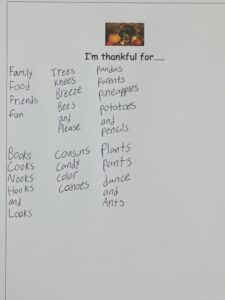
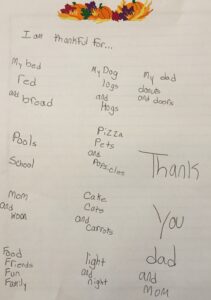
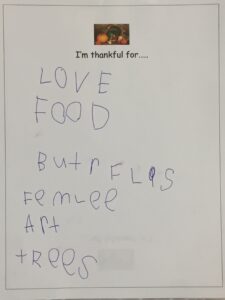
Print the Lesson
Here’s the full lesson for you to print out and use.
Popcorn!
AND, at all of my Thanksgiving workshops, I bring my super easy to use popcorn popper.
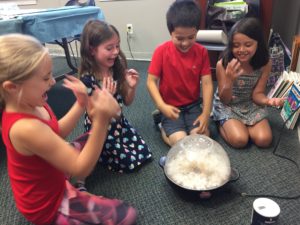
It’s another great add on to the lesson that the kids REALLY ENJOY! If you like this guided writing prompt, you’ll also want to try the summer Packing-A List Poem, St. Patrick’s Day Limericks and Couplets and Quatrains.
Games that we played following this lesson were:

Fill in the blank-Rhyme
Fill in the Blank Rhyme is fast and fun!
Common Core State Standards
NOTE: This game can address the following Common Core Standard: CCSS.ELA-LITERACY.RF.K.2.A
First, divide the group of children into two groups, a left side and a right side.
Then, one child from each group stands up. Begin a phrase from this list.

Next, the two children race to fill in the blank with a word that rhymes with the phrase!

Fourth, they sit. The next two stand. It’s meant to move quickly and often gets fun and silly!
For example, “Shout a ____” may stump the children so they’ll shout out made up words (that indeed rhyme). You can accept these made up words or wait for them to come up with something that is real such as “Shout a pout,” which itself is funny.
You don’t need to go through the entire list. Play according to the time you have. There are no points, no wins. Just fun!
Print the Instructions
Here are the instructions for you to print out and use.
We also play the regular Fill in the Blank game (without rhyme) following various writing prompts. It can go along with ANY prompt really. It’s just a fast, short, sweet, fun game to play anytime!

